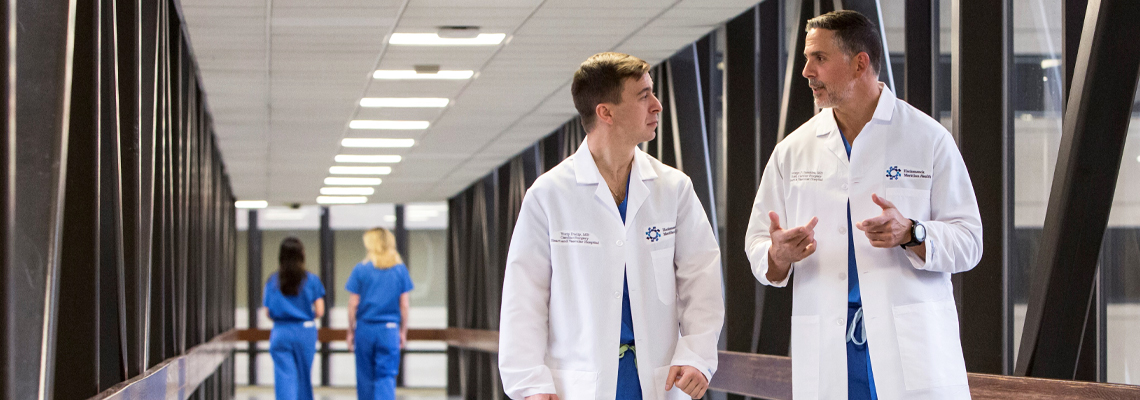
Aurelia Hughes was enjoying a breezy phone chat with her 94-year-old aunt when powerful chest pain and pressure struck in August 2019. Not wanting to alarm her relative, the Farmingdale, New Jersey, woman ended the call by saying she needed to run to the store. But Aurelia’s next move was actually dialing 911—quick thinking that, combined with innovative care at Jersey Shore University Medical Center, saved her life.
“We were joking around and laughing, and then I suddenly felt like there was a ton of bricks on my chest,” recalls the great-grandmother of four, who was 86 at the time.
Aurelia’s condition was swiftly becoming dire. Fluid filled her lungs, and she struggled to breathe as first responders rushed her to Jersey Shore, where doctors whisked her to the cardiac catheterization laboratory. A BiPAP machine, which forces air into the lungs through a mask, helped keep Aurelia stable as cardiologists assessed her failing heart.
“If she had stayed home another half-hour, she probably would have collapsed,” says cardiologist Renato Apolito, M.D., medical director of Jersey Shore’s cardiac cath lab. “It goes to show that we can take the sickest of the sick and with the right tools, right judgment and right care, we can give them a second chance at life.”
Difficult Decision
Aurelia had no prior signs of heart trouble, although she had taken high blood pressure medication for years and was diagnosed with a minor heart murmur as a baby. But now, decades after retirement and despite an active lifestyle, a heart attack arrived with such ferocity that it shocked the longtime widow and created a harrowing treatment dilemma for Dr. Apolito and his team.
Testing showed total blockages in two arteries that, together, supply blood flow to the entire heart. Notably, one was in the left main artery, which Dr. Apolito describes as the “king of all heart blockages.”
This type of blockage is typically remedied with coronary bypass, but Aurelia’s unstable condition and advanced age made open heart surgery too risky. Instead, Dr. Apolito opted to insert coronary stents into Aurelia’s blocked arteries to prop them open, a minimally invasive procedure called angioplasty that’s done through catheters inside blood vessels.
“I thought this was the only way she was going to survive,” Dr. Apolito says. “We had about 30 seconds to think about it, and the only option was to restore blood flow quickly. We felt it was in her best interest to do the more complex procedure and move quickly even though it was nerve-wracking and harrowing.”
Despite the intensity of the four-hour procedure, Aurelia—who remained awake and alert throughout, typical during a catheterization—felt very calm. She credits Dr. Apolito’s reassuring manner.
“If doctors explain what they’re going to do and what you’re going to feel, you’re able to prepare yourself for it,” she says. “Dr. Apolito did that. I can’t tell you how good he was.”
An ‘Exclusive Club’
Aurelia’s immediate turnaround after her heart procedure convinced Dr. Apolito that his approach was inevitably the right decision. The mother of five remained hospitalized for four days—two longer than usual due to her age and case complexity—but both doctor and patient are astounded at her robust recovery.
“Most people with her type of heart attack don’t make it to the hospital. Ninety percent die before they get there,” explains Dr. Apolito, adding that such a blockage typically triggers a fatal irregular heartbeat. “Data suggest that of the 10 percent who make it, half die despite the best efforts. So this puts her in a very exclusive club.”
Several months of cardiac rehabilitation afterward boosted Aurelia’s strength and walking pace. She’s now itching to get back to the gym—a regimen interrupted by the COVID-19 pandemic—and continues enjoying long walks, doing puzzles, reading, baking and driving to the Jersey Shore.
“Today she’s enjoying life like she’s 22. It’s almost like she has no issues,” says Dr. Apolito, adding that rigorous follow-up care is key. “As long as she stays on her medication, I don’t know why she can’t live to 100 and beyond.”
For her part, Aurelia prefers to focus on the here and now instead of looking far ahead. “I don’t even think about the future,” she says. “Maybe because I’ve seen so much over the years, I think that life is too short. Enjoy it while you can.”
Next Steps & Resources:
Meet our source: Renato Apolito, M.D. To make an appointment with Dr. Apolito or another doctor near you, call 800-822-8905 or visit our website.
Learn more about cardiac catherization at Hackensack Meridian Health
Learn about cardiac rehab at Jersey Shore University Medical Center
Can COVID-19 cause a heart attack?
What does a cardiac stress test mean?